新概念英语第二册(Lesson4)学习笔记-全
新概念英语第二册笔记(精美打印版)
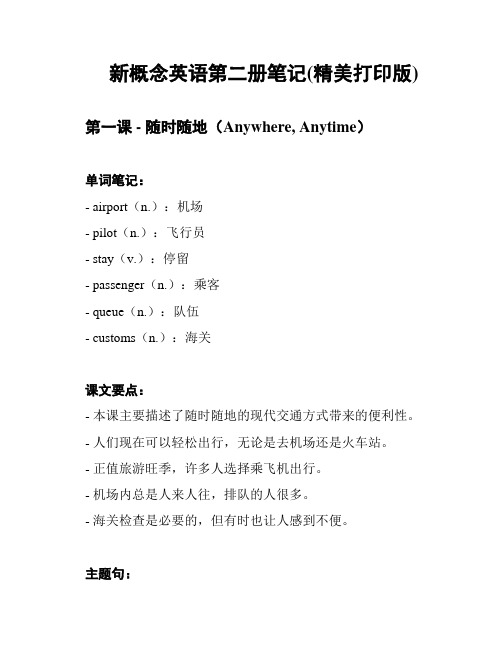
新概念英语第二册笔记(精美打印版)第一课 - 随时随地(Anywhere, Anytime)单词笔记:- airport(n.):机场- pilot(n.):飞行员- stay(v.):停留- passenger(n.):乘客- queue(n.):队伍- customs(n.):海关课文要点:- 本课主要描述了随时随地的现代交通方式带来的便利性。
- 人们现在可以轻松出行,无论是去机场还是火车站。
- 正值旅游旺季,许多人选择乘飞机出行。
- 机场内总是人来人往,排队的人很多。
- 海关检查是必要的,但有时也让人感到不便。
主题句:现代交通方式的进步使我们能够随时随地旅行。
语法重点:- 本课中出现了一些现在进行时的句子,如:People are going to airports and railway stations.(人们正前往机场和火车站。
)- 该课还涉及到一些定冠词的用法,如:I like the customs officer.(我喜欢海关工作人员。
)- 其他值得注意的语法点包括人称代词的宾格形式、形容词比较级等。
第二课 - 奇怪的事(Something Strange)单词笔记:- strange(adj.):奇怪的- fly(v.):飞- cloud(n.):云- monster(n.):怪物- little(adj.):小的- eat(v.):吃- bird(n.):鸟课文要点:- 本课主要讲述了一个小男孩和他的奇怪经历。
- 有一天,男孩看到了一只怪物,它是一个身穿红色衣服、长着绿色头发和眼睛的生物。
- 怪物告诉男孩,他不会飞,但是他能飞到云中间。
- 然后,怪物吃了一些小鸟。
- 最后,怪物告诉男孩他会在树上等待,然后就飞走了。
主题句:男孩看到了一个奇怪的怪物,并与它进行了交谈。
语法重点:- 这篇课文中包含了一些过去式的动词,如:He ate five small birds.(他吃了五只小鸟。
完整版)新概念英语第二册lesson-4(含课文、练习)

完整版)新概念英语第二册lesson-4(含课文、练习)b) Tim is an XXX。
2.What has Tim XXX?XXX.3.Where is Alice Springs?Alice Springs is a small town in the XXX.4.Where is Tim going after he visits Darwin?XXX.5.Why is Tim finding this trip exciting?Tim is XXX because he has never been abroad before.Tim works as an XXX Austrian company。
It is XXX is true een Tim working for an Austrian firm or a big firm。
but it is known that he works as an engineer。
The true statement is that Tim has been in Darwin for six months。
It is not his first timetraveling abroad。
as he is XXX is not in the center of Australia。
and there is no n given about Tim'XXXXXX。
Tim has been in Australia for six months。
and it is unclear how long he will stay。
His XXX。
XXX an Australian car。
but there is no n given about when he bought it。
Tim has never been to Alice Springs before。
新概念英语_第二册_Lesson4

【辨】 exciting, thrilling ['θrɪlɪŋ] exciting 通常来形容让人很激动的人或事; thrilling 用来形容让人激动或害怕的发抖、令 人难以控制情绪的事
-ed自己感到 interested, bored, -ing令人感到interesting,boring, I am interested in this book. This is an interesting book.
in the centre (of sp),
adj. central中央的,中心的
■abroad adv. 在国外,到处,海外,广泛
get abroad 出去, 出门; (谣言)传出去, 传开 go abroad 去国外 live abroad 到国外定居 study abroad 到国外学习 She is hungry for news of her husband working abroad. 她渴望得到国外工作的丈夫的消息。 他在国外生活了许多年。 He lived abroad for many years. 你出国度假吗? Are you going abroad for your holidays? 他有生以来从未到过国外。 He’s never been abroad in his life.
excited 感到兴奋的
-ed自己感到 interested, bored, relaxed -ing令人感到interesting,boring,relaxing
Language points
4. He has just bought an Australian car and has gone to Alice springs. He has gone to the south.(还在) He has been to the south.(去过) 5. He is finding this trip very exciting. find+n+adj.觉得…怎么样 e.g.I find the film boring. Do you find the book very interesting?
新概念英语第二册笔记(word版共275页)

新概念英语第二册笔记(word版共275页)newconceptenglishbook2§lesson1aprivateconversation私人谈话【newwordsandexpressions】生词和短语★privateadj.私人的如果妈妈想看你的信,你可以说:it'smyprivateletter.如果陌生人想进你的房子,你可以说:it'smyprivatehouse.privatelife私生活由此衍生出来privacyn.隐私:privatelife私生活it‘sprivacy.这就是我的隐私!(不愿使别人晓得的)新东方是privateschool(私立学校),与此相反,公立学校是publicschool.所以,private的反义词是public.eg.public公众;publicletter公开信;publicplace公共场所private还有一个值得注意的意思:普通的.例如:privatecitizen普通公民:i‘maprivatecitizen.priv atesoldier大兵;我们熟悉的《拯救大兵瑞恩》就是《privateryan》★conversationn.谈话subjectofconversation:话题(天气是英国人最喜爱的话题)几种谈话:1、talk内容可以正式宣布可不正式宣布,也可以私人:let‘shaveatalk.2、conversation一般用于正式文体中,内容上往往不正式:theyarehavingaconversation.3、dialogue对话,可以指正式国家与国家会谈:chinaandkoreaarehavingadialogue.4、chat闲聊,就是北京人说的d侃‖,说的是无关紧要的事.5、gossip嚼舌头,说长道短havea+talk/chat/dialogue/conversation/gossip名词变动词★seatn.座位这个词很重要,考试常考.haveagoodseat,这里的seat指place(指地点极好),而不是chair.takeaseat/takeyourseat起身去,就坐下面这个句子在口语、电影里很常见:istheseattaken?(这个位置有人吗?)考点:做为动词的seat与sit的区别sit--vi;seat―vteg:heissittingthere.他住在那儿.youseathim.你给他找个位置.seatsb让某人就坐,后面会加人eg:seatyourselft.seathim.★playn.戏★loudlyadv.大声的★angryadj.生气的cross=angry;iwasangry.hewascross.annoyed:恼火的;程iwasannoyed.度iwasangry/cross.加iwasveryangry.深beblueintheface:iamblueintheface.(脸色都紫了,相当生气了)★bear(bore,borne)v.容忍bear,standican'tbear/standyouendure[]:忍受,容忍putupwith:忍受igotdivorced(再婚).icouldnotputupwithhimbear/stand/endure承受的音速在加强putupwith=bear=standbearn.熊whitebearbearhug:热情(热烈)的拥抱givesbabearhug★businessn.事,营生businessman:生意人dobusiness:经商gotosomeplaceonbusiness:因公出差iwenttotianjinonbusiness.thing可以指事情,也可以指东西business:某人自己的私人的事情it'smybusiness(指私人的事,自己处置的事)it'snoneofyourbusiness【课文讲解】gotothetheatreseeafilm=gotothecinemagotothe+地点则表示回去某地干嘛gotothedoctor's回去就医gotothedairy回去牛奶店gotothe+人+'s表示去这个人开的店gotothebutcher's买肉gotoschool:去上学gotochurch:去做礼拜gotohospital(医院):去看病gotothegreatwallgohome;跟home相连一定则表示没事情可以搞,回家歇息iamathome在家歇息enjoy,enjoyoneself:玩玩的高兴enjoy+sth:讨厌,从当中获得一种享用ilikesomethingverymuch./ilovesomething.ienjoytheclass.ienjoythemusic.ienjoythe book.enjoythedinner/film/progeam/gameweresitting:当时正座在过去进行时态:过去的某个时间正在发生的动作一个故事的背景往往用进行时态描述i+be+v(ing)thegirlwasreadingabookinthegarden.aboycametoher.got:显得,则表示一种变化,gotangryiam/wasangry就是一个事实igotangry:特别强调变化过程itishot.itgothot.got取代be动词,got是一个半联系动词,可以直接加形容词turnround:转头notpayanyattention=paynoattention表示注意,payattention;对什么加以注意,payattentiontosthnotany=noicouldnotbearit./you./thenoise.ican'thearaword.美音:肯定ican[]否定,ican't[]?,它的/t/是吞进去的,在读音上很难区别,只能根据上下文来定2.如果时间和地点连在一起,先摆地点,再放时间如果问何时何地,就是一个紧固配搭whenandwhere(4)...aheadof:在...前面(+时间、位置)(动态的行为)aheadoftimehegoesaheadofme.5______didthewriterfeel?angry.a.whereb.whyc.howd.when(5)...c...how――对一个方式、状态回答特定疑问词对后面的答案回答angry(adj)how(adv.)――对形容词、副词、介词短语提问where――用介词,地点when――用介词,时间why――用because回答11thewritercouldnotbearit.hecouldnot______it.a.carryb.sufferc.standd.lift(11). ..suffer:遭受,忍受(精神或肉体上)+痛苦bear:承受=standisuffertheheadache.heoftensuffersdefeat.§lesson2breakfastorlunch?早餐还是午餐?【newwordsandexpressions】生词和短语★untilprep.直至直至...才;直至...年才后面加(时间状语)从句,前面就是主句1)hisfatherdidn'tdieuntilhecameback.(确实)直至他回去,他爸爸才死去.2)hisfatherwasaliveuntilhecameback.(否定)直到他回来为止,他爸爸都是活着的.至他回去这一点之前,没有死去:notdie;活的:不作not.把until做为时间中止线从句的时间终点之前,这个动作做了还是没做?做了――肯定;没做――否定.forhe___a(c)___(wait)untilitstoppedraining.a.waitedb.didn'twaita.leaveb.leftc. didn'tleaveistayinbeduntiltwelveo'clock.ididn'tgetupuntil12o'clock.★outsideadv.外面作状语heiswaitingformeoutside.itiscoldoutsid.ring(rang.rung)v.(铃、电话等)响(刺耳的)[注]这种响是刺耳的,往往是提醒人做某事thetelephone(doorbell)isringing.而风铃等响要用jinglejingle(bell):(铃儿)响叮当给某人打电话:ringsb.tomorrowi'llringyou.打电话(名):givesb.aringremembertoringme/remembertogivemearing戒指(名词)n★auntn.姑,姨,婶,舅妈(所有长一辈的女性都用这个称呼)与此相同,男性则是uncle:叔叔他们的孩子:cousin:堂兄妹(不分男女)cousin的孩子:nephew:外甥,niece:外甥女[记:d挡下‖]★repeatv.重复【text】lesson2breakfastorlunch?早餐还是午餐?firstlistenandthenanswerthequestion.听到录音,然后提问以下问题.whywasthewriter'sauntsurprised?'buti'mstillhavingbreakfast,'isaid.'whatareyoudoing?'sheasked.'i'mhavingbreakf ast,'irepeated.'dearme,'shesaid.'doyoualwaysgetupsolate?it'soneo'clock!'参照译文那是个星期天,而在星期天我是从来不早起的,有时我要一直躺到吃午饭的时候.上个星期天,我起得很晚.我望望窗外,外面一片昏暗.d鬼天气!‖我想,d又下雨了.d正在这时,电话铃响了.是我姑母露西打来的.d我刚下火车,d她说,d我这就来看你.d“但我还在吃早饭,d我说道.“你在干什么?‖她问道.“我正在吃早饭,d我又说道了一遍.“天啊,d她说,d你总是起得这么晚吗?现在已经1点钟了!‖【课文传授】onsundays:所有的星期天,每逢星期天never:从来不(可以轻易用在动词前面)=not(变为否定句,前面一定会用助动词)idon'tlikeher.=ineverlikeher.因为就是上个星期,所以时态不是通常现在时.lookoutof:朝窗外看看outof就是紧固配搭从...里:from,outofdark:天很白whataday?what+a+n.――感叹句itisaterribleday.==>whataterribleday!what+a/an(+a.)+n.(+主语+谓语)whataterribleday!省略:1.主、曰随时可以省whatagoodgirl(sheis)!2.省形容词whataday!有上下文和一定的语境,才能省略形容词.justthen:就在那时itwasmyauntlucy.如果不晓得对方性别,可以用it替代。
【第二次修订完全版】新概念英语第二册笔记pdf(96课全)

目录Lesson 1 A private conversation 私人谈话 (4)Lesson 2 Breakfast or lunch? 早餐还是午餐 (11)Lesson 3 Please send me a card 请给我寄一张明信片 (16)Lesson 4 An exciting trip 激动人心的旅行 (21)Lesson 5 No wrong numbers 无错号之虞 (25)Lesson 6 Percy Buttons 珀西.巴顿斯 (31)Lesson 7 Too late 为时太晚 (38)Lesson 8 The best and the worst最好的和最差的 (44)Lesson 9 A cold welcome 冷遇 (49)Lesson 10 Not for jazz不适于演奏爵士乐 (55)Lesson 11 One good turn deserves another礼尚往来 (60)Lesson 12 Goodbye and good luck 再见,一路顺风 (64)Lesson 13 The Greenwood Boys 绿林少年 (68)Lesson 14 Do you speak English? 你会讲英语吗? (74)Lesson 15 Good news 佳音 (80)Lesson 16 A polite request 彬彬有礼的要求 (85)Lesson 17 Always young 青春常驻 (90)Lesson 18 He often does this! 他经常干这种事! (96)Lesson 19 Sold out 票已售完 (99)Lesson 20 One man in a boat 独坐孤舟 (104)Lesson 21 Mad or not? 是不是疯了? (110)Lesson 22 A glass envelope 玻璃信封 (115)Lesson 23 A new house 新居 (119)Lesson 24 It could be worse 不幸中之万幸 (122)Lesson 25 Do the English speak English? 英国人讲的是英语吗? (125)Lesson 26 The best art critics 最佳艺术评论家 (130)Lesson 27 A wet night 雨夜 (136)Lesson 28 No parking 禁止停车 (143)Lesson 29 Taxi! 出租汽车! (149)Lesson 30 Football or polo?足球还是水球? (154)Lesson 31 Success story 成功者的故事 (159)Lesson 32 Shopping made easy 购物变得很方便 (165)Lesson 33 Out of the darkness 冲出黑暗 (171)Lesson 34 Quick work 破案“神速” (177)Lesson 35 Stop thief! 捉贼 (180)Lesson 36 Across the Channel 横渡海峡 (186)Lesson 37 The Olympic Games 奥林匹克运动会 (193)Lesson 38 Everything except the weather 唯独没有考虑到天气 (198)Lesson 39 Am I all right? 我是否痊愈? (203)Lesson 40 Food and talk 进餐与交谈 (208)Lesson 41 Do you call that a hat? 你把那个叫帽子吗? (213)Lesson 42 Not very musical 并非很懂音乐 (219)Lesson 43 Over the South Pole 飞越南极 (224)Lesson 44 Through the forest 穿过森林 (229)Lesson 45 A clear conscience 问心无愧 (234)Lesson 46 Expensive and uncomfortable 既昂贵又受罪 (238)Lesson 47 A thirsty ghost 嗜酒的鬼魂 (243)Lesson 48 Did you want to tell me something? 你想对我说什么吗? (247)Lesson 49 The end of a dream 美梦告终 (250)Lesson 50 Taken for a ride 乘车兜风 (256)Lesson 51 Reward for Virtue 对美德的奖赏 (262)Lesson 52 A pretty carpet 漂亮的地毯 (267)Lesson 53 Hot snake 触电的蛇 (272)Lesson 54 sticky fingers 粘糊的手指 (278)Lesson 55 Not a gold mine 并非金矿 (282)Lesson 56 Faster than sound! 比声音还快! (291)Lesson 57 Can I help you, madam? 您要买什么,夫人? (298)Lesson 58 A blessing in disguise? 是因祸得福吗? (305)Lesson 59 In or out? 进来还是出去? (311)Lesson 60 The future 卜算未来 (315)Lesson 61 Trouble with the Hubble 哈勃望远镜的困境 (318)Lesson 62 Affer the fire 大火之后 (323)Lesson 63 She was not amused 她并不觉得好笑 (329)Lesson 64 The Channel Tunnel 海峡隧道 (334)Lesson 65 Jumbo versus the police 小象对警察 (339)Lesson 66 Sweet as honey!像蜜一样甜! (344)Lesson 67 Volcanoes 火山 (349)Lesson 68 Persistent纠缠不休 (357)Lesson 69 But not murder!并非谋杀! (359)Lesson 70 Red for danger危险的红色 (362)Lesson 71 A famous clock 一个著名的大钟 (366)Lesson 72 A car called Bluebird“蓝鸟”汽车 (369)Lesson 73 The record-holder纪录保持者 (371)Lesson 74 Out of the limelight 舞台之外 (376)Lesson 75 SOS呼救信号 (380)Lesson 76 April Fools' Day愚人节 (386)Lesson 77 A successful operation 一例成功的手术 (388)Lesson 78 The last one? 最后一枝吗? (392)Lesson 79 By air 乘飞机 (397)Lesson 80 The Crystal Palace 水晶宫 (400)Lesson 81 Escape 脱逃 (403)Lesson 82 Monster or fish? 是妖还是鱼? (406)Lesson 83 After the elections 大选之后 (409)Lesson 84 On strike 罢工 (412)Lesson 85 Never too old to learn 活到老学到老 (415)Lesson 86 Out of control 失控 (419)Lesson 87 A perfect alibi 极好的不在犯罪现场的证据 (421)Lesson 88 Trapped in a mine困在矿井里 (423)Lesson 89 A slip of the tongue 口误 (426)Lesson 90 What's for supper? 晚餐吃什么? (429)Lesson 91 Three men in a basket 三人同篮 (434)Lesson 92 Asking for trouble 自找麻烦 (437)Lesson 93 A noble gift 崇高的礼物 (439)Lesson 94 Future champions 未来的冠军 (442)Lesson 95 A fantasy 纯属虚构 (445)Lesson 96 The dead return 亡灵返乡 (447)本文档仅用于学习交流之用,不得用于商业目的。
新概念英语第二册 lesson 4 笔记和答案
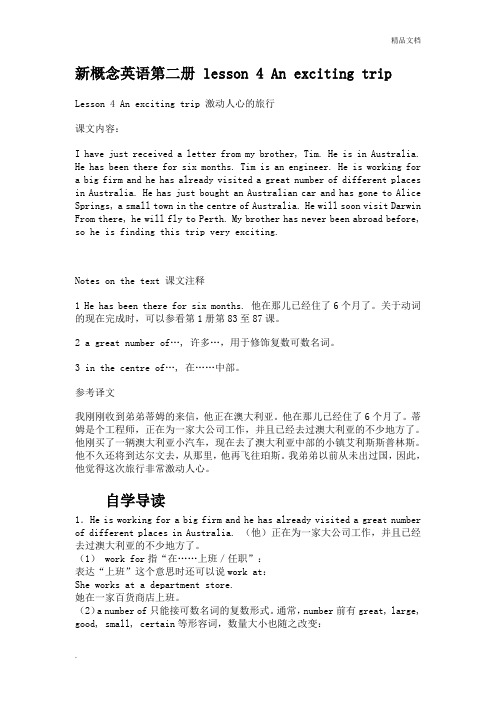
新概念英语第二册 lesson 4 An exciting trip Lesson 4 An exciting trip 激动人心的旅行课文内容:I have just received a letter from my brother, Tim. He is in Australia. He has been there for six months. Tim is an engineer. He is working for a big firm and he has already visited a great number of different places in Australia. He has just bought an Australian car and has gone to Alice Springs, a small town in the centre of Australia. He will soon visit Darwin From there, he will fly to Perth. My brother has never been abroad before, so he is finding this trip very exciting.Notes on the text 课文注释1 He has been there for six months. 他在那儿已经住了6个月了。
关于动词的现在完成时,可以参看第1册第83至87课。
2 a great number of…, 许多…,用于修饰复数可数名词。
3 in the centre of…, 在……中部。
参考译文我刚刚收到弟弟蒂姆的来信,他正在澳大利亚。
他在那儿已经住了6个月了。
蒂姆是个工程师,正在为一家大公司工作,并且已经去过澳大利亚的不少地方了。
他刚买了一辆澳大利亚小汽车,现在去了澳大利亚中部的小镇艾利斯斯普林斯。
裕兴 新概念英语 第二册 Lesson 4 第4课 笔记讲义
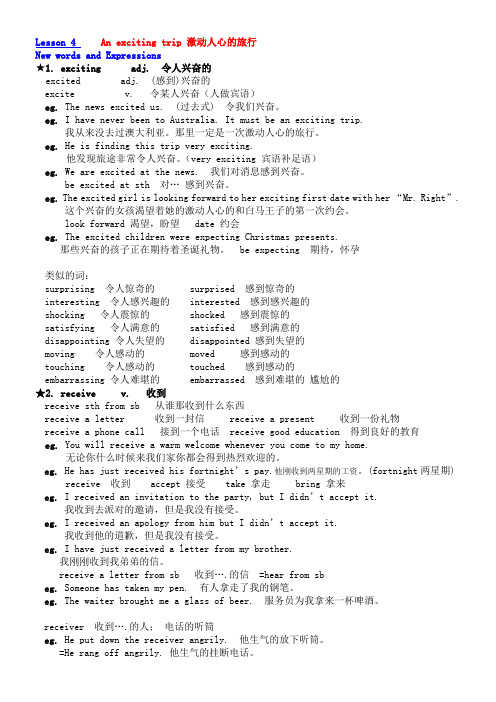
Lesson 4 An exciting trip 激动人心的旅行New words and Expressions★1. exciting adj. 令人兴奋的excited adj. (感到)兴奋的excite v. 令某人兴奋(人做宾语)eg. The news excited us. (过去式) 令我们兴奋。
eg. I have never been to Australia. It must be an exciting trip.我从来没去过澳大利亚。
那里一定是一次激动人心的旅行。
eg. He is finding this trip very exciting.他发现旅途非常令人兴奋。
(very exciting 宾语补足语)eg. We are excited at the news. 我们对消息感到兴奋。
be excited at sth 对…感到兴奋。
eg.The excited girl is looking forward to her exciting first date with her “Mr. Right”.这个兴奋的女孩渴望着她的激动人心的和白马王子的第一次约会。
look forward 渴望,盼望 date 约会eg. The excited children were expecting Christmas presents.那些兴奋的孩子正在期待着圣诞礼物。
be expecting 期待,怀孕类似的词:surprising 令人惊奇的 surprised 感到惊奇的interesting 令人感兴趣的 interested 感到感兴趣的shocking 令人震惊的 shocked 感到震惊的satisfying 令人满意的 satisfied 感到满意的disappointing 令人失望的 disappointed 感到失望的moving 令人感动的 moved 感到感动的touching 令人感动的 touched 感到感动的embarrassing 令人难堪的 embarrassed 感到难堪的尴尬的★2. receive v. 收到receive sth from sb 从谁那收到什么东西receive a letter 收到一封信 receive a present 收到一份礼物receive a phone call 接到一个电话 receive good education 得到良好的教育eg. You will receive a warm welcome whenever you come to my home.无论你什么时候来我们家你都会得到热烈欢迎的。
第二次修订完全版新概念英语第二册笔记pdf课全

第⼆次修订完全版新概念英语第⼆册笔记pdf课全⽬录Lesson 1 A private conversation 私⼈谈话 (4)Lesson 2 Breakfast or lunch? 早餐还是午餐 (11)Lesson 3 Please send me a card 请给我寄⼀张明信⽚ (16)Lesson 4 An exciting trip 激动⼈⼼的旅⾏ (21)Lesson 5 No wrong numbers ⽆错号之虞 (25)Lesson 6 Percy Buttons 珀西.巴顿斯 (31)Lesson 7 Too late 为时太晚 (38)Lesson 8 The best and the worst最好的和最差的 (44)Lesson 9 A cold welcome 冷遇 (49)Lesson 10 Not for jazz不适于演奏爵⼠乐 (55)Lesson 11 One good turn deserves another礼尚往来 (60)Lesson 12 Goodbye and good luck 再见,⼀路顺风 (64)Lesson 13 The Greenwood Boys 绿林少年 (68)Lesson 14 Do you speak English? 你会讲英语吗? (74)Lesson 15 Good news 佳⾳ (80)Lesson 16 A polite request 彬彬有礼的要求 (85)Lesson 17 Always young 青春常驻 (90)Lesson 18 He often does this! 他经常⼲这种事! (96)Lesson 19 Sold out 票已售完 (99)Lesson 20 One man in a boat 独坐孤⾈ (104)Lesson 21 Mad or not? 是不是疯了? (110)Lesson 22 A glass envelope 玻璃信封 (115)Lesson 23 A new house 新居 (119)Lesson 24 It could be worse 不幸中之万幸 (122)Lesson 25 Do the English speak English? 英国⼈讲的是英语吗? (125)Lesson 26 The best art critics 最佳艺术评论家 (130)Lesson 27 A wet night ⾬夜 (136)Lesson 28 No parking 禁⽌停车 (143)Lesson 29 Taxi! 出租汽车! (149)Lesson 30 Football or polo?⾜球还是⽔球? (154)Lesson 31 Success story 成功者的故事 (159)Lesson 34 Quick work 破案“神速” (177)Lesson 35 Stop thief! 捉贼 (180)Lesson 36 Across the Channel 横渡海峡 (186)Lesson 37 The Olympic Games 奥林匹克运动会 (193)Lesson 38 Everything except the weather 唯独没有考虑到天⽓ (198) Lesson 39 Am I all right? 我是否痊愈? (203)Lesson 40 Food and talk 进餐与交谈 (208)Lesson 41 Do you call that a hat? 你把那个叫帽⼦吗? (213)Lesson 42 Not very musical 并⾮很懂⾳乐 (219)Lesson 43 Over the South Pole 飞越南极 (224)Lesson 44 Through the forest 穿过森林 (229)Lesson 45 A clear conscience 问⼼⽆愧 (234)Lesson 46 Expensive and uncomfortable 既昂贵⼜受罪 (238)Lesson 47 A thirsty ghost 嗜酒的⿁魂 (243)Lesson 48 Did you want to tell me something? 你想对我说什么吗? (247) Lesson 49 The end of a dream 美梦告终 (250)Lesson 50 Taken for a ride 乘车兜风 (256)Lesson 51 Reward for Virtue 对美德的奖赏 (262)Lesson 52 A pretty carpet 漂亮的地毯 (267)Lesson 53 Hot snake 触电的蛇 (272)Lesson 54 sticky fingers 粘糊的⼿指 (278)Lesson 55 Not a gold mine 并⾮⾦矿 (282)Lesson 56 Faster than sound! ⽐声⾳还快! (291)Lesson 57 Can I help you, madam? 您要买什么,夫⼈? (298)Lesson 58 A blessing in disguise? 是因祸得福吗? (305)Lesson 59 In or out? 进来还是出去? (311)Lesson 60 The future ⼘算未来 (315)Lesson 61 Trouble with the Hubble 哈勃望远镜的困境 (318)Lesson 62 Affer the fire ⼤⽕之后 (323)Lesson 63 She was not amused 她并不觉得好笑 (329)Lesson 64 The Channel Tunnel 海峡隧道 (334)Lesson 65 Jumbo versus the police ⼩象对警察 (339)Lesson 66 Sweet as honey!像蜜⼀样甜! (344)Lesson 69 But not murder!并⾮谋杀! (359)Lesson 70 Red for danger危险的红⾊ (362)Lesson 71 A famous clock ⼀个著名的⼤钟 (366)Lesson 72 A car called Bluebird“蓝鸟”汽车 (369)Lesson 73 The record-holder纪录保持者 (371)Lesson 74 Out of the limelight 舞台之外 (376)Lesson 75 SOS呼救信号 (380)Lesson 76 April Fools' Day愚⼈节 (386)Lesson 77 A successful operation ⼀例成功的⼿术 (388) Lesson 78 The last one? 最后⼀枝吗? (392)Lesson 79 By air 乘飞机 (397)Lesson 80 The Crystal Palace ⽔晶宫 (400)Lesson 81 Escape 脱逃 (403)Lesson 82 Monster or fish? 是妖还是鱼? (406)Lesson 83 After the elections ⼤选之后 (409)Lesson 84 On strike 罢⼯ (412)Lesson 85 Never too old to learn 活到⽼学到⽼ (415)Lesson 86 Out of control 失控 (419)Lesson 87 A perfect alibi 极好的不在犯罪现场的证据 (421) Lesson 88 Trapped in a mine困在矿井⾥ (423)Lesson 89 A slip of the tongue ⼝误 (426)Lesson 90 What's for supper? 晚餐吃什么? (429)Lesson 91 Three men in a basket 三⼈同篮 (434)Lesson 92 Asking for trouble ⾃找⿇烦 (437)Lesson 93 A noble gift 崇⾼的礼物 (439)Lesson 94 Future champions 未来的冠军 (442)Lesson 95 A fantasy 纯属虚构 (445)Lesson 96 The dead return 亡灵返乡 (447)本⽂档仅⽤于学习交流之⽤,不得⽤于商业⽬的。
裕兴新概念英语第二册笔记 第四十一课 课文讲解
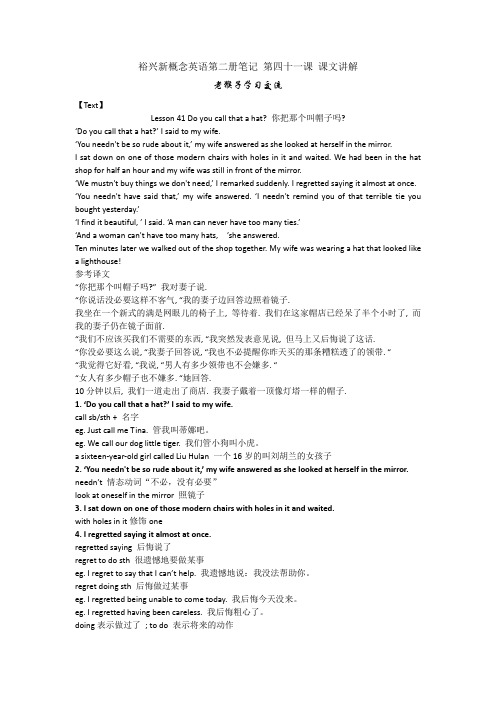
裕兴新概念英语第二册笔记第四十一课课文讲解老猴子学习交流【Text】Lesson 41 Do you call that a hat? 你把那个叫帽子吗?‘Do you call that a hat?’ I said to my wife.‘You needn't be so rude about it,’ my wife answered as she looked at herself in the mirror.I sat down on one of those modern chairs with holes in it and waited. We had been in the hat shop for half an hour and my wife was still in front of the mirror.‘We mustn't buy things we don't need,’ I remarked suddenly. I regretted saying it almost at once. ‘You needn't have said that,’my wife answered. ‘I needn't remind you of that terrible tie you bought yesterday.’‘I find it beautiful, ’ I said. ‘A man can never have too many ties.’‘And a woman can't have too many hats, ’she answered.Ten minutes later we walked out of the shop together. My wife was wearing a hat that looked like a lighthouse!参考译文“你把那个叫帽子吗?” 我对妻子说.“你说话没必要这样不客气, “我的妻子边回答边照着镜子.我坐在一个新式的满是网眼儿的椅子上, 等待着. 我们在这家帽店已经呆了半个小时了, 而我的妻子仍在镜子面前.“我们不应该买我们不需要的东西, “我突然发表意见说, 但马上又后悔说了这话.“你没必要这么说, “我妻子回答说, “我也不必提醒你昨天买的那条糟糕透了的领带. ““我觉得它好看, “我说, “男人有多少领带也不会嫌多. ““女人有多少帽子也不嫌多. “她回答.10分钟以后, 我们一道走出了商店. 我妻子戴着一顶像灯塔一样的帽子.1. ‘Do you call that a hat?’ I said to my wife.call sb/sth + 名字eg. Just call me Tina. 管我叫蒂娜吧。
新概念英语第二册课后练习答案lesson4

新概念英语第二册课后练习答案l e s s o n24 This model paper was revised by LINDA on December 15, 2012.新概念英语第二册课后习题答案详解Lesson 24练习答案 Key to written exercises1.难点练习答案A 1 received 2 on the 3 On the4 believes5 of6 salary7 lend 8 asked for 9 Apart from10 an irritable 11 are 12 pay attention to 13 Remember 14 suit 15 grow up16 beside 17 It's…exciting 18 understand19 home 20 There isB 1 What a wonderful garden(this is)!2 What a lot of trouble he is causing!3 What a tall building (it is)!4 What a clever girl you are!C 1 He handed the prize to me.2 The waiter brought the man a bottle of beer.3 I've ordered you some soup.4 Bring me that book please!5 She promised the finder a reward.D 1 haven't any/have no money.2 I didn't go anywhere/went nowhere in the holidays.3 There wasn't anybody/was nobody present when the accident happened.E 1 It's George's.2 It's that woman's.3 I like Keats' poetry best.4 They're the children's.5 They're the soldiers'.F 1 off 2 back 3 up 4 over 5 on 6 awayG 1 I put my hat on.2 I took my coat off.3 He put the fire out.4 They cut the king's head off.2.多项选择题答案1. b根据课文第2-3行‘I left the money in my room,’ I said, ‘and it’s not there now’, 只有b. someone had stolen his money 符合作者的推测。
新概念英语第二册Lesson4一6词汇学习

【导语】新概念英语学习的“重复原则”,即在整体教法上注重听、说、读、写的反复训练,从量变到质变,让学⽣们的英语⽔平得到质的飞跃。
以下是整理的新概念英语第⼆册Lesson4⼀6词汇学习,欢迎阅读!1.新概念英语第⼆册Lesson4词汇学习 1.receive vt. (1)接到,收到,得到: When did you receive that letter? 你什么时候收到那封信的? Susan received a gift/card this morning. 今天上午苏珊收到了⼀份礼物/⼀张卡。
receive是“收到”,指的是⼀个被动的动作,主观上接受与不接受并不清楚。
take则是主动地“拿”、“取”: He told me to take the keys from his pocket. 他让我从他⼝袋⾥把钥匙拿出来。
I received a beautiful pen from my uncle. My brother took it from me yesterday. 我叔叔给了我⼀枝漂亮的钢笔。
昨天我弟弟把笔拿⾛了。
(2)招待,接待: You need a large room if you are going to receive so many guests. 如果你要接待这么多客⼈,你就需要⼀个⼤房间。
We usually receive guests on Saturday. 我们通常星期六招待宾客。
2.different adj. (名词为difference) (1)不同的,相异的(经常与from连⽤): Desks are different from tables. 书桌与桌⼦不⼀样。
My room is different form yours. 我的房间与你的不同。
We are planning something different this year. 我们今年有不同的打算。
(完整版)裕兴新概念英语第二册笔记完美打印版

Lesson 1 A private conversation【New words and expressions】★private① adj. 私人的private life 私生活private school 私立学校② adj. 普通的private citizen 普通公民I’m a private citizen. (citizen n. 公民)private soldier 大兵《Private Ryan》《拯救大兵瑞恩》) public adj. 公众的,公开的(private的反义词)public school 公立学校public letter 公开信public place 公共场所privacy n.隐私It’s privacy. 这是我的隐私!(不愿让别人知道的)★conversation n.谈话have a + talk/chat/dialogue/conversation/gossip 名词变动词conversation 一般用于正式文体中, 内容上往往不正式subject of conversation 话题They are having a conversation.talk 内容可正式可不正式, 也可以私人Let’s have a talk.dialogue 对话, 可以指正式国家与国家会谈China and Korea are having a dialogue.chat 闲聊,就是北京人说的“侃”,无关紧要的事。
gossip 嚼舌头, 说长道短★theatre n.剧场, 戏剧cinema n.电影院★seat n.座位have a good seat/place,这里的seat指place(指地点),而不是chair.take a seat/take your seat 坐下来, 就坐Is the seat taken? 这个位置有人吗?请坐的3种说法:Sit down, please. (命令性)Take your seat, please.Be seated, please. (更礼貌)作为动词的seat与sit的区别sit(sat,)vi. 就座He is sitting there.他坐在那儿。
Lesson4Anexcitingtrip(教学设计)-2024-2025学年新概念英语第二册

(3)讨论课文中的关键句型,如:“We went to... We visited... We saw...”等,让学生们模仿并练习使用这些句型。
此外,课后作业的布置也让我意识到,学生们在写作方面的能力还有待提高。在今后的教学中,我将加强对学生写作技巧的指导,如如何构思文章、如何运用连接词等,帮助他们提高写作水平。
在拓展资源方面,我推荐了与旅行相关的阅读材料和视听资源,希望学生们能够在课后进行自主学习,拓宽视野。但从学生的反馈来看,他们对这些资源的利用程度并不高。因此,我考虑在下一节课中,专门安排一段时间让学生分享他们在课后拓展学习中的收获,以此激发他们的学习兴趣。
(2)布置作业:“For homework, please write a short passage about your own exciting trip using the past tense. You can use the vocabulary rned today.”
核心素养目标
学情分析
本节课面向的学生群体为四年级学生,他们在英语学习上已具备一定的词汇量和基本的语法知识,能够使用简单句型进行日常交流。在知识层面,学生对一般过去时态有初步了解,但对其运用尚需加强。能力上,学生的听说能力相对较强,但写作和阅读理解能力有待提高。此外,学生具有较高的学习热情和好奇心,对于旅行等贴近生活的话题表现出浓厚兴趣,有利于激发学习动机。然而,部分学生在课堂参与度和注意力集中方面存在差异,可能会影响课程学习效果。因此,在教学过程中,应关注个体差异,采用多样化的教学策略,确保每位学生都能在原有基础上得到提升,充分发挥课本内容在实际语境中的应用价值。
新概念英语第二册Lesson4 An exciting trip
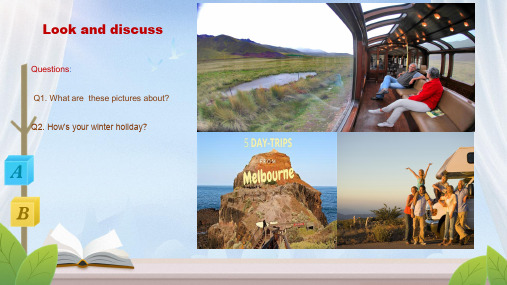
Look and discussCatherine QQ33035527 Questions:Q1. What are these pictures about?Q2. How’s your winter holiday?An Exciting tripCatherine QQ33035527•trip : |trɪp| a journey to a place and back again, especially a short one for pleasure or a particular purpose (尤指短程往返的)旅行,旅游,出行•Did you have a good trip?•你旅行顺利吗?•We went on a trip to the mountains.•我们到山里去旅游了。
• a day trip (= lasting a day)一日游• a boat/coach trip 乘船/ 长途汽车旅行• a business/school/shopping trip•出差;学校旅行;去商场购物Listen and completeCatherine QQ33035527•I have just received a ______ from my brother, Tim. He is in ______. He has been there for six months. Tim is an ______. He is working for a big firm and he has ______visited a great number of different places in Australia. He has just______ an Australian car and has gone to Alice Springs, a small town in the ______of Australia. He will soon ______ Darwin. From there, he will fly to Perth.My brother has never been ______before, so he is finding this trip very exciting.Catherine QQ33035527新概念英语第二册Lesson4 An exciting tripNew words and expressionsCatherine QQ33035527• 1. exciting: |ɪkˈsaɪtɪŋ|adj. 令人激动的;使人兴奋的•eg. An exciting story/discovery•激动人心的故事/ 发现•excited:adj. ~ (about/at/by sth) | ~ (to do sth)feeling or showing happiness and enthusiasm 激动的;兴奋的•eg. The children were excited about opening their presents.•孩子们对打开礼物感到兴奋不已•An excited crowd of people gathered around her.•一群激动的人聚集在她周围•Some horses become excited when they're in traffic.•有些马在车流中会受惊。
(完整版)新概念英语第二册lesson-4(含课文、练习)
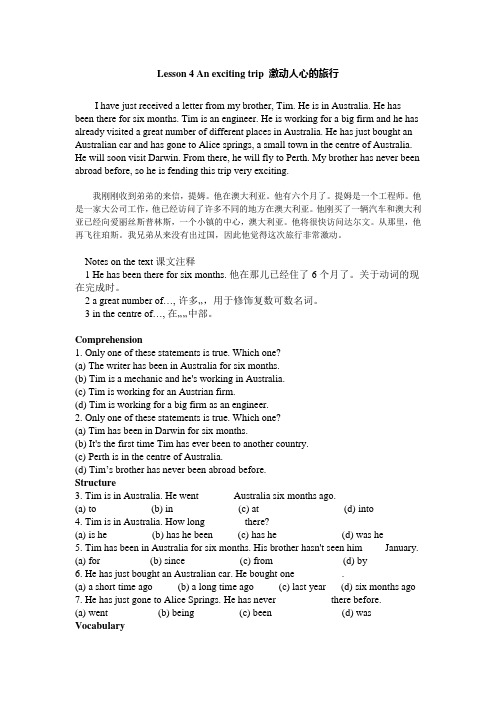
Lesson 4 An exciting trip 激动人心的旅行I have just received a letter from my brother, Tim. He is in Australia. He has been there for six months. Tim is an engineer. He is working for a big firm and he has already visited a great number of different places in Australia. He has just bought an Australian car and has gone to Alice springs, a small town in the centre of Australia. He will soon visit Darwin. From there, he will fly to Perth. My brother has never been abroad before, so he is fending this trip very exciting.我刚刚收到弟弟的来信,提姆。
他在澳大利亚。
他有六个月了。
提姆是一个工程师。
他是一家大公司工作,他已经访问了许多不同的地方在澳大利亚。
他刚买了一辆汽车和澳大利亚已经向爱丽丝斯普林斯,一个小镇的中心,澳大利亚。
他将很快访问达尔文。
从那里,他再飞往珀斯。
我兄弟从来没有出过国,因此他觉得这次旅行非常激动。
Notes on the text 课文注释1 He has been there for six months. 他在那儿已经住了6个月了。
关于动词的现在完成时。
2 a great number of…, 许多…,用于修饰复数可数名词。
3 in the centre of…, 在……中部。
新概念英语第二册课后练习答案lesson4
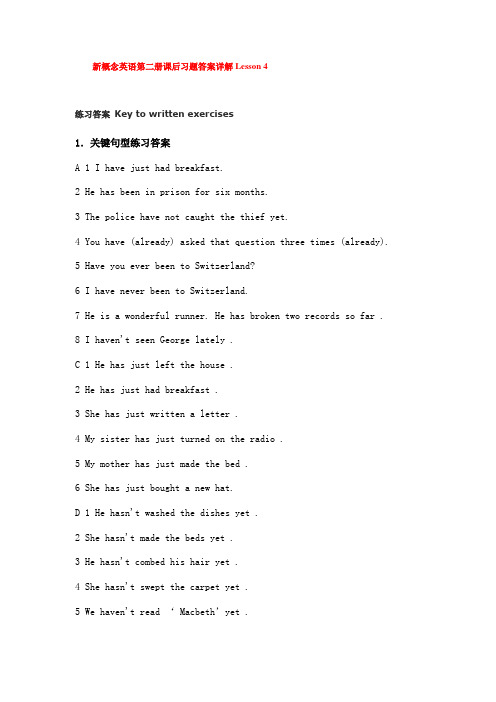
新概念英语第二册课后习题答案详解Lesson 4练习答案Key to written exercises1.关键句型练习答案A 1 I have just had breakfast.2 He has been in prison for six months.3 The police have not caught the thief yet.4 You have (already) asked that question three times (already).5 Have you ever been to Switzerland?6 I have never been to Switzerland.7 He is a wonderful runner. He has broken two records so far .8 I haven't seen George lately .C 1 He has just left the house .2 He has just had breakfast .3 She has just written a letter .4 My sister has just turned on the radio .5 My mother has just made the bed .6 She has just bought a new hat.D 1 He hasn't washed the dishes yet .2 She hasn't made the beds yet .3 He hasn't combed his hair yet .4 She hasn't swept the carpet yet .5 We haven't read ‘ Macbeth’yet .E 1 Have you seen the new play at ‘The Globe’yet ?2 Have you taken your holidays yet ?3 Have you read this book yet ?4 Have you done your homework yet ?5 Have you finished your work yet ?2 .难点练习答案1 received2 received3 took4 taken5 take3.多项选择题答案1. d根据课文内容Tim is an engineer. He is working for a big firm..., 只有d. Timis working for a big firm as an engineer 是对的,其他3个与文章不符合。
新概念英语第二册lesson-4(含课文、练习)

新概念英语第二册lesson-4(含课文、练习)Lesson 4 XXX激动人心的旅行XXX there for six months。
Tim is an engineer。
He is working for a big XXX car and has gone to Alice springs。
a small town in the XXX。
From there。
he will fly to Perth。
My brother has never beenabroad before。
so he is XXX.我方才收到弟弟的来信,XXX。
他在澳大利亚。
他有六个月了。
XXX是一个工程师。
他是一家大公司事情,他曾经拜候了很多分歧的中央在澳大利亚。
他刚买了一辆汽车和澳大利亚曾经向XXX,一个小镇的中央,澳大利亚。
他将很快拜候XXX。
从那边,他再飞往珀斯。
我兄弟历来没有出过国,因而他感觉此次游览十分冲动。
XXX课文解释1 He has been there for six months.他在那儿曾经住了6个月了。
关于动词的目前完成时。
2 a great number of…,很多…,用于润饰复数可数名词。
3 XXX…,在……中部。
n1.Only one of these statements is true。
Which one?a) XXX.b) XXX.c) Tim is working for an Austrian firm.d) Tim is working for a big firm as an engineer.2.Only one of these statements is true。
Which one?a) Tim has been in Darwin for six months.b) It's the first time Tim has ever been to another country.c) XXX XXX Australia.d) Tim’s brother has never been abroad before.Structure3.Tim XXX ______ Australia six months ago.a) to(b) in(c) at(d) XXX _______ there?a) is he(b) has he been(c) has he(d) was he5.Tim has been in Australia for six months。
- 1、下载文档前请自行甄别文档内容的完整性,平台不提供额外的编辑、内容补充、找答案等附加服务。
- 2、"仅部分预览"的文档,不可在线预览部分如存在完整性等问题,可反馈申请退款(可完整预览的文档不适用该条件!)。
- 3、如文档侵犯您的权益,请联系客服反馈,我们会尽快为您处理(人工客服工作时间:9:00-18:30)。
新概念英语第二册(Lesson 4)学习笔记
Lesson 4
An exciting trip
激动人心的旅行
Read and then answer the question.
读一读,然后回答以下问题。
Why is Tim finding this trip exciting?
为什么蒂姆发现这次旅行激动人心?
I have just received a letter from my brother, Tim. 我刚刚收到弟弟蒂姆的来信,
He is in Australia.
他正在澳大利亚。
He has been there for six months.
他在那儿已经住了6个月了。
Tim is an engineer.
蒂姆是个工程师,
He is working for a big firm and he has already visited a great number of different places in Australia.
正在为一家大公司工作,并且已经去过澳大利亚的不少地方了。
He has just bought an Australian car and has gone to Alice springs, a
small town in the centre of Australia.
他刚买了一辆澳大利亚小汽车,现在去了澳大利亚中部的小镇艾利斯斯普林斯。
He will soon visit Darwin.
他不久还将到达尔文去,
From there, he will fly to Perth.
从那里,他再飞往珀斯。
My brother has never been abroad before, so he is finding this trip very exciting.
我弟弟以前从未出过国,因此,他觉得这次旅行非常激动人心。
【精讲笔记】
△exciting adj.令人兴奋的
v.excite 激动
adj.excited ,exciting
-ed:自己感到;-ing:令人感到
如:interesting:令人感到有趣的;
interested:感到有意思的
动词的宾语一定是人,让后面的人感到……
eg:The news excited me.
The book interests me.
△receive v.接受,收到
※3个接受:
①accept:同意接收,主观上乐意
②receive(与have通用):客观的收到
receive/have a letter from sb
eg:This morning I received a bunch of flowers from a boy,but I didn't
accept it.
③take:接受,与前两词无可比性,只需记住两个搭配:take the exam;take advice
△firm n.商行,公司
等同于company
△abroad adv.在国外
注意是个副词,直接和动词连用,不需要介词
go/live/study abroad
△have been+in +地点
他已经到北京了:He has arrived in Beijing.
他到北京一年了,就不能用arrive了。
因为arrive是表示点的动词,不能和段时间连用。
所以用我们的新句型:have been in+ 地点
He has been in Beijing for one year.
△work in 强调工作的地点
work for 强调work,不是在游逛,是在工作
△a great number of后面一定要加可数名词复数
a lot of可加可数名词也可加不可数名词
它们是约等于的关系
I have a lot of/a great number of friends.
I have a lot of time.中的a lot of 就不能替换为 a great number of了
△have gone to :去了某地没回来
have been to :曾经去过某地,现在不在那个地方
△from there:从那地方起
from既可以加时间又可以加地点
eg:from half past 8 to half past 11
from Beijing to Tianjin
△fly to Perth=go to Perth by air
△find+宾语+形容词做宾补
find trip exciting;find the room clean
注意,在本句中用的是find的进行时态。
在收听外台的广播中经常能听到find不用一般式,而用进行式。
eg:We're finding the program very exciting.
在写的时候用一般式,口语就用进行式
下面表示状态、感觉、情绪、精神活动的动词不可用于进行时态:believe doubt see hear know understand belong think consider feel look seem show mind have sound taste require possess care like hate love detest desire。
